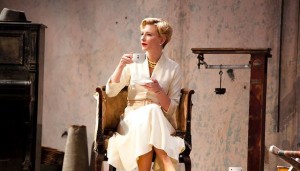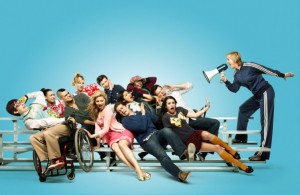The Sydney Theatre Company’s production of Chekhov’s Uncle Vanya, adapted by STC’s co-artistic director Andrew Upton, opened at the Kennedy Center in D.C. this past weekend and will run until August 27. Cate Blanchett (STC’s other co-artistic director) as Yelena, Hugo Weaving (Agent Smith!) as Astrov, and Jacki Weaver as Marina head a stellar cast.
My sister Thuy and thirteen-year-old niece Aline caught the Sunday performance and below are their thoughts on it. As you read, you might accuse me of putting words in Aline’s mouth but I assure you I’m not quite sophisticated enough to use “ennui” and “tropes” in everyday conversation.
If you need a synopsis of the play (you weren’t the only one who fell asleep in tenth-grade English), click here. Read on for a discussion that covers Blanchett’s performance, how boring middle-aged people’s problems are to teenagers, and how Glee compares to Chekhov.—PCN
************
Thuy: Dad warned me about taking you to see Uncle Vanya. He was concerned this play is not exactly a picnic. So, did you like it?
Aline: In general, I liked it. However, on a deeper level, I didn’t find myself really emotionally invested in the characters and their problems.
T: Is it because the characters are middle-aged people?
A: No, I don’t think so. I think it might have just been a matter of taste, but I just couldn’t bring myself to really care about the situations they were in (maybe because of how mundane they were?)
 T: Have you seen Cate Blanchett in any of her films?
T: Have you seen Cate Blanchett in any of her films?
A: Yes, I saw her in the Elizabeth movies and Lord of the Rings.
T: What do you think of the characters she played in those movies, as compared to Yelena in Uncle Vanya?
A: I thought that all of those characters shared a certain grace or elegance in the way they moved; her physical movements are usually smooth and languid. She also tends to play characters with an air of regality about them.
T: So would you say that she seems remote in both her film and stage roles?
A: While I’m not saying she’s not passionate, her characters always seem to be expected to carry power and beauty, while acting calm or in control. I think as Yelena she was good enough—she undoubtedly played the part gracefully—but I feel like Yelena wasn’t given much to work with character-wise, other than being the object of several men’s affections. Stripping away her appeal to the other characters, she seems to have almost no other clear defining traits.
T: I agree. I think Cate Blanchett is really stunning…with her cheekbones, great carriage, the way she moves across the stage and that low-octave, beautiful diction. But as Yelena, I don’t find her very compelling, which is kind of odd, as you would think an actor’s portrayal should be inseparable from her physical self.
Anyway, what do you think about the other characters? How about lovelorn Sonya who is in love with the doctor but knows she’s too plain to catch his attention? Surely any play about frustrated characters who can’t get what they want is something that anyone can relate to?
A: That may be true, but to truly empathize with the characters, I need for them to be explored more. Many of the characters could be summarized by only a few traits, e.g., Yelena—admired but bored, or Sonya—loving but plain.
T: You mean the production didn’t reveal them to you on a deeper level? Are they too broadly drawn, on the level of slapstick or sitcom, so to speak?
A: I don’t think they’re slapstick, just that any character could fit into the same categories as these Chekhov characters.
T: What about Astrov and his concern for the environment? His fear of man’s tendency to destroy nature for the sake of his own survival? Don’t you think that’s something we can relate to?
A: Yes, but I felt his passion for conservationism is overshadowed by his love for Yelena.
T: You may be right. And I don’t quite see the chemistry between Hugo Weaving and Cate. But you said you did like the scene when they all got drunk.
A: Yes, the getting drunk was good! I felt like for most of the play, the characters liked to keep a tight lid on their emotions, and that might have caused some of the conflict in the story.
T: But if everyone acts out, then there is no tension, right? For example, in Hamlet, only Hamlet acts as if he is mad, so the tension comes from everyone else not acting crazy and thinking that only Hamlet is crazy.
A: True, but I think part of the tension in Hamlet is caused by higher stakes being set by the emotions—it’s for the crown of Denmark rather than the ennui of some people on a Russian farm.
T: You don’t think day-to-day ennui is a great enough topic for tragedy?
A: I feel this isn’t exactly a tragedy, though. The characters in the beginning are basically the same as in the end; their fortunes haven’t risen or fallen…None of the characters seem deliberately malicious toward others as they are unable to reveal themselves to those around them. Thus, the play is not a tragedy, more like a series of events caused by the characters hiding their emotions.
T: Would you say it’s more like a black comedy, then?
A: Yes, more so than a tragedy, at least, because of the moments of humor and the fact that no long-term misfortune has been caused by the end.
T: So there must be a dead body for it to be labeled a true tragedy?
A: Not necessarily, but I think it’s implied in the ending that all the characters would recover from the events that have taken place and return to normal life.
T: But what is “normal” life? Is it possible that these characters die a little by making compromises?
A: I think the characters would heal….Chekhov’s theme of “idleness breeds dissent” is reflected in how, throughout the play, all the characters state their boredom, and how, in the end, it looks like the first genuinely peaceful scene when everyone starts getting back to work.
 T: You said earlier that you couldn’t relate to the characters in the play, since their emotions don’t seem to be based on high moral or political stakes. But how is it different from, say, enjoying Glee?
T: You said earlier that you couldn’t relate to the characters in the play, since their emotions don’t seem to be based on high moral or political stakes. But how is it different from, say, enjoying Glee?
A: I love Glee for both the melodrama (so addictively fun!) and for the fact that the characters and their issues can be reflected more in contemporary society. Or maybe I just feel invested because I like these worlds and I want to be lost in them and exploring them, and that could apply to any show. I want to be in bright, poppy McKinley High, or in the TARDIS traveling across the universe with Dr. Who, or slaying demons in the Hellmouth with Buffy. I don’t deny that Uncle Vanya’s world is complex and interesting, but maybe I can’t bring myself to care so deeply for these characters because I can’t truly imagine living with them.
T: So you don’t imagine that your parents may be a little like these Chekhov characters? You know, once you reach your forties, you tend to regret a bit. Of course, I have tried to spare you from my own neuroses [laughs].
A: Of course! And I don’t doubt that. I honestly think it’s a matter of taste. Because of my mindset, I couldn’t honestly connect with them.
T: Fair enough. Now I’m wondering if I should have waited until you’re older to introduce you to Chekhov. I just figured since you like Shakespeare, you would like Chekhov, since they are both about the human heart.
A: I like Shakespeare because of the wittiness and verbal sparring in the comedies and also the historical settings. I’m a sucker for things that took place in English courts or imperial Rome, and somehow I find those situations—usually on the stakes of other people’s heads or which person gets to wear a crown—so much more interesting simply because of how disproportionate and immoral plotting and punishment could be back then, compared to more nuanced, smaller tragedies that happen on a less grand scale.
T: Would you say that’s the difference between classical and modern? In some way, you could say that Glee depends on good old-fashioned narrative structure, and Chekhov is modern because he is so spare.
A: I think that’s a fair point, though we often equate “modern” with “contemporary.” I suppose in some cases it’s not true. What we see today still depends on old tropes, character archetypes, and plot devices.
T: That’s an excellent point, Aline. I suppose Glee or popular entertainment in general, while “contemporary,” is pretty traditional in scope, whereas something like Chekhov is not for everyone because it does not try to please or change anything. You could say that Chekhov’s plays, like Yelena’s beauty, are “useless.” But I’m still glad that I took you to see the play, if only for the fact that we could have this conversation.
A: Thanks! I thought it was fun, too, and maybe I’ll try revisiting Chekhov again in a few years. Heh.
Vanya photos: Lisa Tomasetti, Glee: FOX








3 Comments
Reader#9
August 10, 2011 at 10:38 amWow! Your niece never seems to amaze me with her intellectual insight. Although her age does show through when she gets excited and the last word of her final response reminds us all that she is still a teenage girl. Still, after reading this back and forth I find myself inspired to speak more intelligently the rest of the day. LoL!
The Kennedy Center’s staff would do well to post this in the lobby between acts.
Poncho
August 10, 2011 at 12:18 pmGotta say (again) that your niece is a genious! She’s got great knowledge and fantastic insight -and yet I somehow still felt like I was reading a teenager.
I have to say though, Cate Blanchett is regal, but she can play gritty & low (e.g. Little Fish). Anyway, I worship her. And I was amazed -and terrified- by Jacki Weaver in Animal Kingdom.
I have to admit that I’m not a Chekhov fan myself (unless you’re meaning USS Enterprise’s very own Pavel, Ha!), but I’d love to see the play just to see all that talent in the same place.
Thanks very much for this!
EIREGO
August 10, 2011 at 1:05 pmI agree with Reader#9, Kennedy Center should post this in the lobby!
Always amazed at how intelligent teens are these days. This was a really insightful discussion.